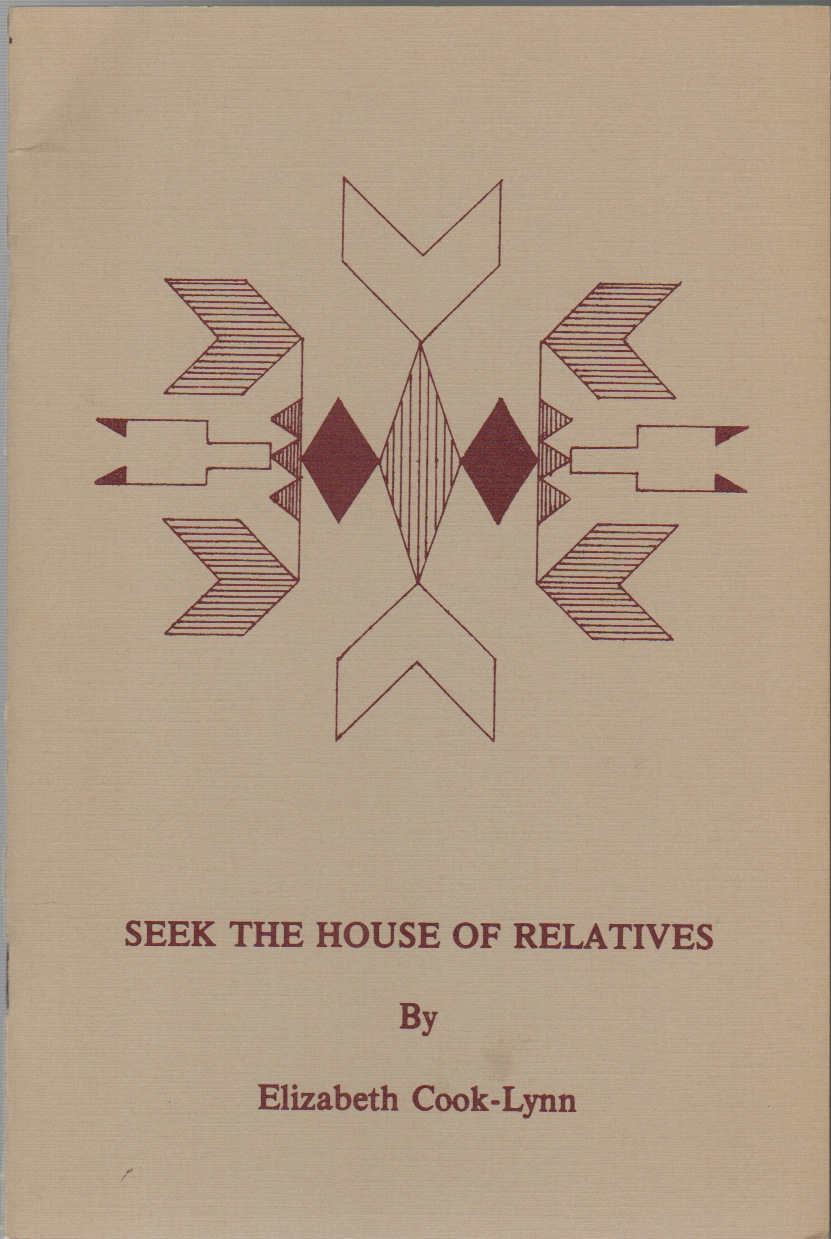ISSN: 1941-4137
POETRY THAT ENACTS THE ARTISTIC AND CREATIVE PURITY OF GLASS
POETRY THAT ENACTS THE ARTISTIC AND CREATIVE PURITY OF GLASS

Reed Bobroff (Diné) is a Pushcart Prize-nominated writer, performer, and educator from Albuquerque, NM. His work has been published in journals and anthologies like The Breakbeat Poets, The Great Vanishing Act, and on HBO. After graduating from Yale University in 2016, he conducted research at the Yale Child Study Center studying the therapeutic benefits of writing. His own writing challenges personal identity and social issues as a process of reflection and growth. Reed is a Spoken Word Immersion Fellow through the Loft Literary Center and works with youth around the country to use writing as a tool for self-expression and healing.
October 23, 2018
Edited by Stephanie Kaylor
#TBT Reviews Series
Edited by Stephanie Kaylor
#TBT Reviews Series
Review of Seek The House of Relatives by Elizabeth Cook-Lynn
 Seek The House of Relatives
by Elizabeth Cook-Lynn
Blue Cloud Quarterly Press, 1983
A matriarch of indigenous canon, Elizabeth Cook-Lynn (member of the Crow Creek Sioux Tribe) is an essential voice in understanding the scope history of writers from indigenous communities. I have always known her as a fearless writer and theorist through her role as the founding editor of Wičazo Ša Review (Red Pencil Review), as a professor, and as an artist. From her early writings in college at South Dakota State University in response to the frustration she felt in her class on Westward Expansion, she has continued to write and work against colonialism and injustice ever since. A champion of Native voices and writers, Cook-Lynn remains a respected critic and writer in American Literature.
Her chapbook, Seek the House of Relatives from Blue Cloud Quarterly Press, is a small collection of poems and stories that explore a variety of relationships as they are affected by indigenous cultures (i.e., Crow Creek stories, Powwow, etc.) and colonization. Cook-Lynn spends significant time exploring the physical landscape and its connection to her community and grounds each piece in its place. She presents birds, grasses, family, and memory in a way that allows readers to see all of our relatives — with blood or with roots — represented equally. It is through this process that we can identify the balance Cook-Lynn brings into her work and understand how all beings (in her poetry and the universe) carry equal weight in sustaining our world.
Maybe I’m projecting. I read Cook-Lynn’s poems from the lens of a Diné citizen from Albuquerque, NM. While we both come from indigenous communities, as an outsider to her home, I can only infer the meaning in her work. From my own background, I read her colors and directions and can say for certain that anything so specific cannot be without purpose. When Cook-Lynn writes “[t]hey trimmed their deer skins / in red down feathers… Dancers with cane whistles, / born under the sign of hollow stems” in her poem, “Journey”, I know the dancers’ regalia are designed with a deep history (unfamiliar to me) in their material and pigment. This is just to say that these are not lines for me. Maybe there’s a Diné person out there with the knowledge to interpret those lines effectively, but as a guest in these poems — without context or a generous translator — I recognize that moments like these are a nod to those who know: a re-presentation of culture and story.
Cook-Lynn establishes a reality through her poems and drops us into them, inviting us to sit and bear witness to her vision and experience. It could be argued that Cook-Lynn’s poems self-select their audience with the lack of contextualization, but I think her work mimics the way culture persists. Sometimes you get an explanation and sometimes you just have to wait. Listen. Observe. Pay attention to the details or you might miss the meaning. Cook-Lynn rewards patience. Somewhere near the middle of the chapbook she offers, “[h]e slit the yellow belly of a rattler / to show the children how the ancient ones were born”. Here, in “A Poem for My Ex-Brother-In-Law”, she outright shares an indigenous story as she does again her piece of fiction at the end of the collection. There’s a balance of inclusion and exclusion (for non-Crow-Creek readers) throughout the chapbook and Cook-Lynn mostly lets us float in the world she’s built and elicits no pressure to contextualize or explain her poems.
Seek the House of Relatives is true to its name. More than words, this chapbook is society; it’s culture; it’s stories that have been carried for generations and minutes. Mostly it’s a collection of poems: fearless poems that know where they come from and who they represent. These poems are acutely aware that they are born from words: the roots of what holds us together. Cook-Lynn invites us into her world with these writings and reinforces that we are made of the world around us, whether in materials, memory, or moments. And if we seek to understand, patiently and respectfully, we might find family in the stories she’s told.
Seek The House of Relatives
by Elizabeth Cook-Lynn
Blue Cloud Quarterly Press, 1983
A matriarch of indigenous canon, Elizabeth Cook-Lynn (member of the Crow Creek Sioux Tribe) is an essential voice in understanding the scope history of writers from indigenous communities. I have always known her as a fearless writer and theorist through her role as the founding editor of Wičazo Ša Review (Red Pencil Review), as a professor, and as an artist. From her early writings in college at South Dakota State University in response to the frustration she felt in her class on Westward Expansion, she has continued to write and work against colonialism and injustice ever since. A champion of Native voices and writers, Cook-Lynn remains a respected critic and writer in American Literature.
Her chapbook, Seek the House of Relatives from Blue Cloud Quarterly Press, is a small collection of poems and stories that explore a variety of relationships as they are affected by indigenous cultures (i.e., Crow Creek stories, Powwow, etc.) and colonization. Cook-Lynn spends significant time exploring the physical landscape and its connection to her community and grounds each piece in its place. She presents birds, grasses, family, and memory in a way that allows readers to see all of our relatives — with blood or with roots — represented equally. It is through this process that we can identify the balance Cook-Lynn brings into her work and understand how all beings (in her poetry and the universe) carry equal weight in sustaining our world.
Maybe I’m projecting. I read Cook-Lynn’s poems from the lens of a Diné citizen from Albuquerque, NM. While we both come from indigenous communities, as an outsider to her home, I can only infer the meaning in her work. From my own background, I read her colors and directions and can say for certain that anything so specific cannot be without purpose. When Cook-Lynn writes “[t]hey trimmed their deer skins / in red down feathers… Dancers with cane whistles, / born under the sign of hollow stems” in her poem, “Journey”, I know the dancers’ regalia are designed with a deep history (unfamiliar to me) in their material and pigment. This is just to say that these are not lines for me. Maybe there’s a Diné person out there with the knowledge to interpret those lines effectively, but as a guest in these poems — without context or a generous translator — I recognize that moments like these are a nod to those who know: a re-presentation of culture and story.
Cook-Lynn establishes a reality through her poems and drops us into them, inviting us to sit and bear witness to her vision and experience. It could be argued that Cook-Lynn’s poems self-select their audience with the lack of contextualization, but I think her work mimics the way culture persists. Sometimes you get an explanation and sometimes you just have to wait. Listen. Observe. Pay attention to the details or you might miss the meaning. Cook-Lynn rewards patience. Somewhere near the middle of the chapbook she offers, “[h]e slit the yellow belly of a rattler / to show the children how the ancient ones were born”. Here, in “A Poem for My Ex-Brother-In-Law”, she outright shares an indigenous story as she does again her piece of fiction at the end of the collection. There’s a balance of inclusion and exclusion (for non-Crow-Creek readers) throughout the chapbook and Cook-Lynn mostly lets us float in the world she’s built and elicits no pressure to contextualize or explain her poems.
Seek the House of Relatives is true to its name. More than words, this chapbook is society; it’s culture; it’s stories that have been carried for generations and minutes. Mostly it’s a collection of poems: fearless poems that know where they come from and who they represent. These poems are acutely aware that they are born from words: the roots of what holds us together. Cook-Lynn invites us into her world with these writings and reinforces that we are made of the world around us, whether in materials, memory, or moments. And if we seek to understand, patiently and respectfully, we might find family in the stories she’s told.
Glass: A Journal of Poetry is published monthly by Glass Poetry Press.
All contents © the author.
All contents © the author.





